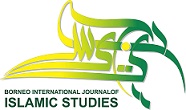The Consideration of Bid‘a Concept according to Saudi and Iranian Scholars
Abstract
The concept of innovation (bid'a) as a formative tool is used to create idiosyncratic nations depending on different scholars' interpretations, Wahhābīs in Saudi Arabia, and Shi'īs in Iran. Using the descriptive method throughout the paper, this article analyzes scholars' approaches towards bid'a concerning the sectarian interpretations and various legal methodologies. The extent of the relationship between the bid'a concept and the rulings related to the visitation of tombs, the practice of temporary marriage, and Nowrūz celebration will be the paper's primary focus. The interpretations and approaches of scholars towards bid'a have resulted in opposite solutions on these mentioned issues. The comparative conclusion aims to clarify the Saudi-Wahhābī and Iranian-Shi'ī scholars' principal attitudes towards the theoretical interpretation and practical application of the bid'a concept. The bid'a analysis attempts to introduce the operative purposes behind the rulings to answer which reasons impel the scholars functioning in these two countries from issuing the diametrically opposite views on controversial issues.
Keywords: Islamic law, Saudi Arabia, Iran, Wahhabism, Ja'farism, Bid'a.
References
Al-Atawneh, Muhammad. Wahhābī Islam Facing the Challenges of Modernity, Dār al-Iftā in the Modern Saudi State. Leiden: Brill, 2010.
Al-Bukhārī, Abū ‘Abdullah Muhammad ibn Ismā‘īl. Jāmī‘ al-Ṣaḥīḥ: The Translation of the Meanings of Ṣaḥīḥ al-Bukhārī. Translated by Muhammad Muhsin Khan. Riyadh: Darussalam, 1997.
Al-Rasheed, Madawi. Contesting the Saudi State: Islamic Voices from a New Generation. New York: Cambridge University Press, 2007.
Al-Sijistānī, Abū Dāwud Sulaymān ibn Ash‘ath al-Azdī. Sunan Abu Dawud. Cairo: Dār Ihyā’ al-Sunnah al-Nabawīyah, 1950.
Betteridge, Anne H., and EIr, Kreyenbroek, Philip G., and Hitchins, Keith. “Festivals iii, iv, v.” In Encyclopaedia Iranica. Accessed July 15, 2020, http://www.iranicaonline.org/articles/festivals-iii-iv-v.
Daniel, Elton L., and Ali Akbar Mahdi. Culture and Custom of Iran. Connecticut: Greenwood Press, 2006.
Fuchs, H., Jong, F. de, and Knappert, J. “Mawlid or Mawlūd.” In Encylopedia of Islam, Second Edition. Brill online. Accessed June 10, 2020, https://referenceworks.brillonline.com/entries/encyclopaedia-of-islam-2/mawlid-a-or-mawlud-COM_0716?s.num=56&s.f.s2_parent=s.f.book.encyclopaedia-of-islam-2&s.start=40&s.q=bid%27a.
Hegghammer, Thomas and Lacroix, Stephane. “Rejectionist Islamism in Saudi Arabia: The Story of Juhayman Al-‘Utaybi Revisited.” In International Journal of Middle East Studies, 39, no:1 (2007):103-122.
Islam Quest. Accessed June 25, 2020, http://www.islamquest.net/en/archive/question/fa5132.
IslamWeb. Accessed June 14, 2020, https://fatwa.islamweb.net/en/fatawa/.
Khomeini, Mousavi. A Clarification of Questions: An Unabridged Translation of Resaleh Towzih al-Masael. Translated by J. Borujedi. Colorado: Westview Press, 1984.
Kingdom of Saudi Arabia The General Presidency of Scholarly Research and Ifta, Royal Embassy of Saudi Arabia. Accessed June 20, 2020, http://www.alifta.net/default.aspx?languagename=en#1.
Kostiner, J. “Al-Su‘ūdiyya al-Mamlaka al-‘Arabiyya.” In Encylopedia of Islam, Second Edition. Brill online. Accessed July 10, 2020, https://referenceworks.brillonline.com/entries/encyclopaedia-of-islam-2/al-suudiyya-al-mamlaka-al-arabiyya-SIM_7219?s.num=57&s.f.s2_parent=s.f.book.encyclopaedia-of-islam-2&s.start=40&s.q=bid%27a
Long, David E. Culture and Custom of Saudi Arabia. Connecticut: Greenwood Press, 2006.
Meri, J. W., Ende, W., and at all. “Ziyāra.” In Encylopedia of Islam, Second Edition. Brill online. Accessed July 11, 2020, https://referenceworks.brillonline.com/entries/encyclopaedia-of-islam-2/ziyara-COM_1390?s.num=91&s.f.s2_parent=s.f.book.encyclopaedia-of-islam-2&s.start=80&s.q=bid%27a.
“Norouz, an Opportunity for Eastern Culture.” The Office of the Supreme Leader Sayyid Ali Khamenei, March 27, 2010. Accessed May 2, 2020, http://www.leader.ir/langs/en/index.php?p=contentShow&id=6609.
Mutçalı, Serdar. Al-Mu‘jam al-‘Arabī al-Ḥadīth Arapça-Türkçe Sözlük. Istanbul: Dağarcık Yayınları, 1995.
Peskes, Esther and Ende, W. “Wahhābiyya.” In Encylopaedia of Islam, Second Edition. Brill online. Accessed July 9, 2020, https://referenceworks.brillonline.com/entries/encyclopaedia-of-islam-2/wahhabiyya-COM_1329?s.num=15&s.f.s2_parent=s.f.book.encyclopaedia-of-islam-2&s.q=bid%27a.
Robson, J. “Bid‘a.” In Encylopaedia of Islam, Second Edition. Brill online. Accessed July 8, 2020, https://referenceworks.brillonline.com/entries/encyclopaedia-of-islam-2/bida-SIM_1393?s.num=0&s.f.s2_parent=s.f.book.encyclopaedia-of-islam-2&s.q=bid%27a.
“Shia-Sunni Dialogue: Bida; Innovation in Islam.” Marifaat of Ahlulbayt. Accessed July 13, 2020, https://marifaat.wordpress.com/2013/06/26/bida-innovation-in-islam/.
The Office of the Supreme Leader Sayyid Ali Khamenei. Accessed July 10, 2020, http://www.leader.ir/tree/index.php?catid=12.
Vogel, Frank E. Islamic Law and Legal System: Studies of Saudi Arabia. Leiden: Brill, 2000.
Yakar, Emine Enise. “The Influential Role of the Practice of Ifta‘ in Saudi Politico-Legal Arena.” Manchester Journal of Transnational Islamic Law and Practice 16, no:1 (2020):35-61.
Zarif, Muhammad M. M., Nizah, Mohd A. M., and at all. “Creating Creative and Innovative Muslim Society: Bid‘ah as an Approach.” Asian Social Science 9, no:11 (2013):121-127. Accessed July 12, 2020, http://www.ccsenet.org/journal/index.php/ass/article/view/30044


.png)






